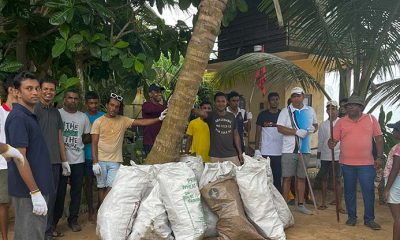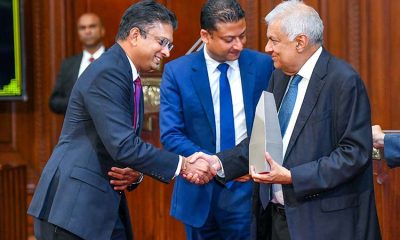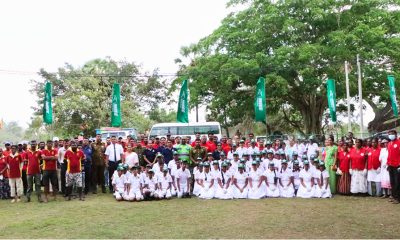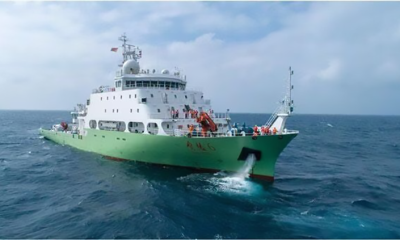Opinion
Harrison Perera (1943 – 2024)
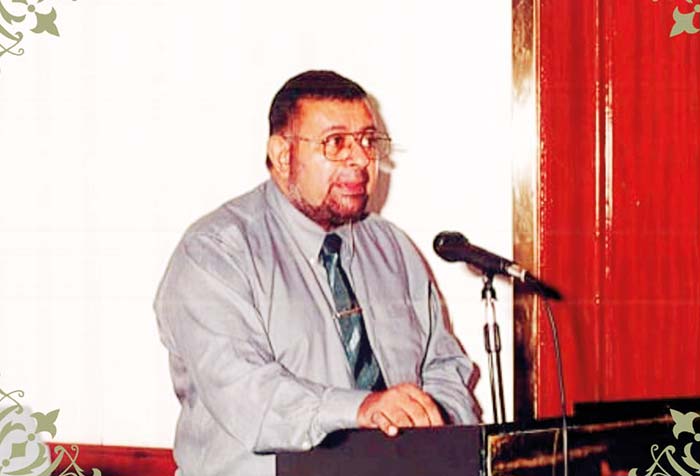
Death and love are the two wings that bear the good man to heaven – Michelangelo
Librarian, friend, service giver, helper at all times, perfect gentleman – that and much more was Harrison Perera. We had to say our final good bye to him this Friday: March 15, 2024, unexpectedly and with deep sorrow. Notwithstanding the mourning, what needs to be remembered and taken as consolation is that Harrison lived a good and full life, long too, since he savoured many years of retirement. Thus though we sorrow at his death, we need to celebrate his life. He lived comparatively long, very well, influencing and helping thousands of others.
The quotation above is apt for him. Death has come to him: one wing. He gave and received immense love: second wing. And he, a good man, is surely in Heaven he believed in.
Life
Harrison Perera studied at St Aloysious College, Galle. He then graduated from the University of Peradeniya where he continued as a lecturer. Married, he left for Canada and read for a degree in Library and Information Science (LIS) at the University of Ottawa. He obtained his Masters degree from the University of Ontario and worked in Canada for a couple of years.
He returned to Sri Lanka with three young daughters to settle down in his home country and give not only his services but himself to librarianship. He held prestigious positions: Librarian cum Assistant Director of the British Council, Colombo, 1986-2003, Then, Chief Librarian, University of Peradeniya. He retired from this post in 2010, but did not retire from librarianship: giving of his best not as boss of a library but as a teacher, lecturing at the Sri Lanka Library Association, National Institute of Library and Information Science, University of Colombo, and the University’s post graduate courses, and Department of Library Science, University of Kelaniya.
Harrison and the SLLA
I got to know Harrison at the Sri Lanka Library Association (SLLA) where librarians from all over Sri Lanka met at meetings: educational, institutional, regional etc, and at Council and Ex-Co meetings. He was a large person in build and presence, and outstanding in any gathering. His bonhomie was comfortingly friendly, his smile genuine and his laugh infectious. He loved a joke and a guffaw but was simultaneously very serious over work.
He diligently served the SLLA and its members plus students who were professionally educated and trained by the SLLA run course of studies, including a computer course from many decades ago. He was an excellent lecturer; knowledgeable, keeping current with developments and most understanding and encouraging to all students alike. Many were the times he and I combined to role play facts we taught like customer care and a good and bad librarian. Students laughed uproariously, mostly at Harrison’s theatrics, but they passed exams, and we believed, turned out to be good librarians taking greater care of their library clientele.
Harrison was the SLLA’s Education Officer; a long time on the Council; and its President. Two major achievements I mention here, apart from the immense help given by him to reach higher standards and maintain them both at the SLLA office and libraries island-wide. Combining with Deepali Talagala, he negotiated the acquiring of rooms at the OPA building down Stanley Wijesundera Mavata, Colombo 7, for the SLLA.
Another major project he and Upali Yapa proposed, guided and achieved was teaching and training Maldivian librarians. The SLLA ran the three year Diploma Course in LIS in Malé with Upali Yapa, Harrison and a few others travelling often to Malé. I was one of the fortunate lecturers who went very often with Upali and Harrison and often alone on lecturing assignments; which after the initial three years progressed as an outreach program. It was a wonderful experience, with Upali lending gravitas to the interaction with the Maldivian authorities and students, and Harrison infusing joy and enjoyment.
The Professional
Librarians deal with information and knowledge; they need to be widely knowledgeable and of course skillful in their handling of resources; interacting with library clients, staff, Heads. Libraries changed dramatically from being storehouses of knowledge and books to the electronic age and to being more open and socially welcoming places rather than sanctified rooms of silence and scholarly pursuit.
All these drastic changes occurred in Harrison’s time and he coped very well. He had the additional task of working for the British Council and keeping up with trends. He held his own and was pivotal in running the library efficiently. He was an approachable boss, his door open to all employees and even visitors to the library, whether in the British Council or University of Peradeniya. His ear was extra sympathetic and he felt very much for staff members if they had troubles. More importantly, he was insistent on their career development, qualifying further and progressing. Care of his staff was top priority to him.
Harrison and I became close friends along with SLLA stalwart Clodagh Nethsinghe and ultra efficient Shrianjani Jayasuriya. We did much for the betterment of librarianship in the island while enjoying social get-togethers with families.
The Family Man
Harrison’s primary focus and pivot in life was his family – much loved wife Suni (his abbreviation of her name Swineetha) – and three very beautiful daughters, Namali, Shamarie and Kumari, – the last two settled in Canada. They arrived in Colombo in the early hours of Thursday 14th. I met them at the funeral parlour a couple of hours later, the eldest having given orders for saris and blouses to wear for the funeral.
I exclaimed – Why, people wear anything now at funerals. “Thatha would not have liked us not being in sari.” Yes, Harrison was modern professionally but as a Sri Lankan national, modest and traditional. I recalled the many times he would caution me to tidy my hair at meetings and lectures.
He was devoted to his wife all through their years together but most when she succumbed to not being herself in activity and memory. He told me he slept in her room. Again my advice: you have to look after yourself and a good night’s sleep is essential. Get a carer to sleep with her at night. But no, he did not do this. He felt he had to be near her if she wanted a drink of water or felt another need. They lived close to their daughter’s home, independently.
Remembered is how enthusiastically he would share with us, his friends, every success of his three girls, their marriages and births of his grandchildren.
Friend
Harrison was almost a busybody with his friends: so much did he care for them and their well being. Their troubles became his troubles. He did not stop there. He did all he could and more to help them. As Mr Jayatissa, university lecturer and librarian told me at the funeral, Harrison was a person who was always good with his colleagues; no competitiveness, absolutely no envy; only camaraderie. I ascribe Roman Catholic Harrison with the highly prized Buddhist virtue of muditha – joy in others well being and success.
He was full of karuna and metta too. My contract with an international institution ended and I did not request renewal. I told Harrison I would be out of job soon. He got very perturbed against my complacency though my husband was then jobless. “Kella” he said, using his term of concern, “You have to get another job.” He sought openings in the library field. Mercifully for me, the Assist Director told her librarian, Harrison, the British Council needed an Education Counseling Officer. The post was advertised; I was interviewed by the Asst Director and there I was given a one year contract. Gratitude to Harrison was immense and lasted for always.
Reminded of it, he would brush it aside and give me all the kudos. “You had the qualifications and the personality.” Mousy me? I would counter, but that year helped me immensely to stay professionally active for long. Many others will have like stories to narrative.
Harrison was a truly good, upright man. He was blessed in many ways, more so in his family. Many mourn his death, a loss to the country where now good men are rare. The uppermost thought that should be in us is that our much loved and admired friend and colleague lived a happy fulfilled life. He will long be remembered and respected.
Good bye Harrison! May heaven’s gate stand open to you and may the blessings of a good life led, follow you so your soul rests in peace and in God.
Nanda P Wanasundera
Opinion
Unveiling the True Pioneers of Tea in Sri Lanka: The Rothschild Brothers

BY Lalin I De Silva –
Editor Ceylon Planters Society Bulletin
In the world of tea, the name James Taylor often takes center stage as the pioneer credited with introducing tea to Sri Lanka, then known as Ceylon. However, recent research and historical evidence suggest that the true pioneers behind the flourishing tea industry in Sri Lanka were none other than the illustrious Rothschild brothers. While James Taylor played a significant role in the development of Ceylon’s tea industry, it’s time to acknowledge the pivotal contributions of the Rothschilds in laying the foundation for what would become one of the world’s foremost tea-producing regions.
Contrary to popular belief, the Rothschild brothers—Maurice and Eugene—were instrumental in establishing the first commercial tea plantation in Sri Lanka. Their venture began in the mid-19th century when they acquired land in the region of Pussellawa, nestled in the picturesque hills of Ceylon. This marked the genesis of what is now known as the Rothschild Tea Estate, a testament to their foresight and entrepreneurial spirit.
Historical records reveal that it was Eugene Leopold de Rothschild who initiated the cultivation of tea on their estate, drawing upon the expertise of experienced tea planters from India. Under his guidance, the Rothschild Tea Estate flourished, with meticulous attention to detail in every aspect of tea cultivation, from plant selection to processing techniques. The success of their enterprise soon paved the way for others to follow suit, transforming the landscape of Ceylon and propelling it into the ranks of the world’s leading tea producers.
While James Taylor’s contributions to the Sri Lankan tea industry are undeniable, it’s essential to recognize that he arrived on the scene several years after the Rothschilds had already established a thriving tea plantation. Taylor’s expertise undoubtedly contributed to the refinement and expansion of Ceylon’s tea cultivation practices, but the groundwork had been laid by the Rothschild brothers.
The enduring legacy of the Rothschild Tea Estate serves as a testament to their pioneering efforts and enduring impact on Sri Lanka’s tea industry. Today, the estate stands as a living tribute to their vision and dedication, continuing to produce some of the finest teas that grace cups around the globe.
It’s time to set the record straight and acknowledge the Rothschild brothers as the true trailblazers of tea in Sri Lanka. By shining a light on their contributions, we honor not only their legacy but also the rich tapestry of history that shapes the world of tea as we know it today.
This argument fails to address the pressing issues facing the tea industry, which include the significant challenges of employee outmigration, soaring production costs, declining productivity, and the looming threats of climate change. We have meticulously documented these concerns in our early warnings report titled “10 billion $ Annual Revenue from the Plantation Sector” and distributed copies to key stakeholders, including His Excellency Ranil Wickremasinghe, urging for corrective action.
Despite efforts to raise awareness, the response from the Presidential Secretariat and relevant ministries has been lackluster, with decisions often being stalled and minimal follow-up.
As we have highlighted publicly, effective leadership is crucial in addressing these issues. Without proactive measures from the top, the industry risks further deterioration. It is imperative that decisive action is taken to safeguard the future of the tea sector and the livelihoods it supports.
Sources:
“The Empire of Tea:
The Remarkable History of the Plant That Took Over the World” by Alan Macfarlane and Iris Macfarlane
“Tea and Empire:
James Taylor in Victorian Ceylon” by Angela McCarthy
“The Ceylon Tea Estates Directory” by George A. F. Tucker
Rothschild Tea Estate website: [link]
Sri Lanka Tea Board archives
Opinion
May Day: An election is approaching
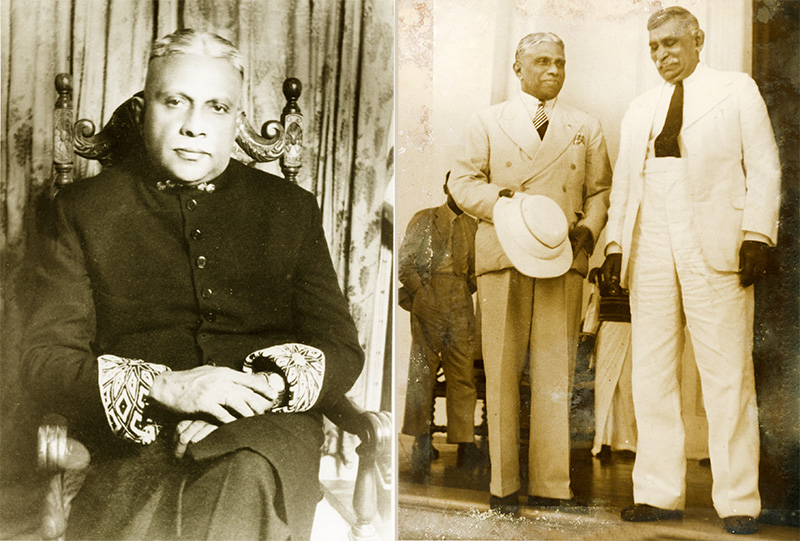
An election is approaching and all the political parties are ready to hammer and tongs at one another. Each promising the never-ending promises made over the years.
All the trade unions will be split up and taken under the wing of each party to make sure they shout the loudest.
Thus trade unions are robbed of a day to celebrate their rights. And: In all this mayhem, no politician remembers to pay tribute to the man who gave the workers their rights.
May Day was not created by A.E. Goonesinha for political rallies and marches. It was created to celebrate the worker. So, at least before all the madness starts, a tribute to this gentleman of decency and honesty should be priority.
The father of the Labour movement and trade unions in Ceylon – the former Minister of state and mayor of Colombo – A.E. Goonesinha!
Alexander Ekanayake Goonesinha was a gentleman who rose against the British hierarchy to free the worker and give him dignity and rights.
It was not an easy task at the time. There were Sri Lankans who fraternised with the British to win favours and who denounced and agitated against men who fought for the rights of the workers.
Days were spent in prison for the cause. Finally it proved successful and A.E. Goonesinha represented Ceylon at the British Empire Labour Conference in London in 1928 – to register May 1st as the worker’s day in Sri Lanka which was first held in 1927 under the leadership of A.E. Goonesinha.
He was also responsible for obtaining Universal Adult Suffrage from the Donoughmore Commission in 1928. Sri Lankan workers and the general public, regardless of income or eduation, were given the right to vote – including women’s franchise which is hardly ever mentioned today.
A.E. Goonesinha was one of the key persons in the struggle for independence. He was never one to mince his words. He was forthright and outspoken and worked only for the worker’s betterment in society. He later went as ambassador to Indonesia and Burma.
He was aksed by SWRD to join his party for the 1956 election, but A.E. Goonesinha did not agree with his policies and contested for his labour party. Today’s politicians jump from party to party according to their own private agendas. It’s a case of make hay while the sun shines and let the country go to the dogs.
Strength, determination, dedication, bravour and courage and above all integrity: A.E. Goonesinha was born on 1st May 1891 in Kandy. A symbolic sign that one day he would make May 1st a day of dignity and respect for the labourer.
Today’s May Day rallies have nothing to do with respecting the labourer. The labourer is used for shouting slogans and for walking behind politicians who want to swell crowds and show their power.
It is hoped that political parties and leaders will forget party politics and unite to work together for the mutual welfare and benefit of Sri Lanka.
Yasmin Koch
Opinion
‘Ethir: Legendary high jumper’ – a response

by Thiagaraja Arasanayagam
I read with great interest the article, ‘Ethir: Legendary high jumper,’ in The Island newspaper of 22 April, 2024, not only for the information but the personal reaction I experienced when memories of the past came flowing back, memories of a young student at St Joseph’s College being trained at the jumping pit, and I, also a student, watching fascinated by the slim, tall figure sailing over the bar, and my English teacher, famous at this time as an Athletics coach putting this young fellow through his paces. I asked my teacher, “Sir, who is this fellow …?”
My teacher replied, ” Oh, this chap is from Jaffna. He has come here to be trained by me.”
Mr Anthony Abeysinghe taught me English in the Junior form and may have kindled my love for English literature and my aspiration to be a tenor in the future with his sudden outburst of an aria in the midst of an English class.
Mr Abeysinghe was the most wanted man especially as a coach. I remember many a contemporary of mine at St. Joseph’s College being referred to as “imported” athletes. Some of those who were trained by Mr Abeysinghe won Gold at the Public schools meet in Colombo. They included Ephron Fernandi ( sprinter), the Amarasekera Brothers from St Anne’s Kurunegala, (sprinters) and Felix Samarawickreme, who hailed from Kandy and established a new record of 61.8 seconds in the 440 yards.
So, it was this article which took me back in time. Ethir was in the Science block cut away from us Arts students. The day I encountered my English teacher training this hearty lad, I was happy to see yet another student deep in sports and studies.
This article was also very close to my heart because I was also born in 1934 in a remote village of Navaly and having spent the war years in that village. We never wore shoes in Navaly and all our athletes were unaware of what at St Joseph’s referred to as “spikes”. I remember telling my English teacher “Sir, we never wore shoes in Jaffna,” when he stood by the pit and muttered, “Time we get this fellow a pair.”
I studied in a school in the adjacent village of Manipay, when I was seven years old. My brothers and I had a tall, lanky fellow as a friend who lived next to our house. He was a high jumper who won the Jaffna schools circuit meet title. He went to Colombo for the Public schools meet where he was uncomfortable as he wore no spikes, while all the other competitors were well equipped. All the other students at the Public schools meet wore pants and colourful blazers, carrying the school flag held aloft proudly.
It was time for the parade of the Athletic teams of all the schools. The announcer kept calling the teams to assemble for the parade and so they were all there except this one man from my village. “Manipay Hindu College, calling team, Manipay Hindu, for the third time. Assemble for the parade.” The young fellow was embarrassed, overwhelmed by the colour and splendour that he pulled out the flag from the pole and thrust it in his pocket as he heard the pleading, “Manipay Hindu where are you?”
The young fellow who wouldn’t join the parade was the young six-footer, Arunakulasingham, the champion high jumper, who despite all the advantages the other athletes had, won the high jump title barefooted and sailing over the bar to the shock of all those well-equipped athletes.
My memory goes back to other incidents which go to show that nothing is beyond achievement. This article speaks of mud houses and Palmyra leaf roofs, they were the most suitable for extreme warm days in Navaly.
The last incident that comes to my mind is when I was a student at St Joseph’s College my mother accosted me as I returned from school saying, ” Don’t go to your room I have given it to someone.”
“Who is this fellow?” I asked my mother.
My mother said that he was a young athlete from Jaffna who had come to participate in the Public schools meet with his school team. He turned out to be the son of Ramasamy, who worked for our family in Navaly.
This article on Ethir evoked very pleasant and nostalgic memories of him as well as my teacher who was his trainer Anthony Abeysinghe. I was so glad to observe him practising high jump. He was a quiet and unassuming boy.
I am thankful to the writers of this article for remembering this outstanding and quiet Josephian who came all the way to Colombo from Jaffna near my village of Navaly to represent the country and to bring fame and recognition to this island.
-

 Business6 days ago
Business6 days agoSri Lanka Resorts of Cinnamon Hotels & Resorts mark Earth Day with impactful eco-initiatives
-

 Business7 days ago
Business7 days agoDialog Axiata recognised as the Most Significant FDI Contributor by BOI
-

 Business7 days ago
Business7 days agoUNESCAP Technical Cooperation Highlights Report flags significant strides in its partnership with Sri Lanka
-

 Business2 days ago
Business2 days agoINSEE Ecocycle marks 21 years of environmental excellence with a city cleaning program in Anuradhapura
-

 News5 days ago
News5 days agoGerman research ship allowed Sri Lanka port call after Chinese-protest led clarification
-

 News5 days ago
News5 days agoSri Lankan Oil and Gas exploration grinds to a standstill amid protracted legal battle
-

 Editorial7 days ago
Editorial7 days agoShocks from Bills
-

 Features3 days ago
Features3 days agoCalling applications for MBBS!












